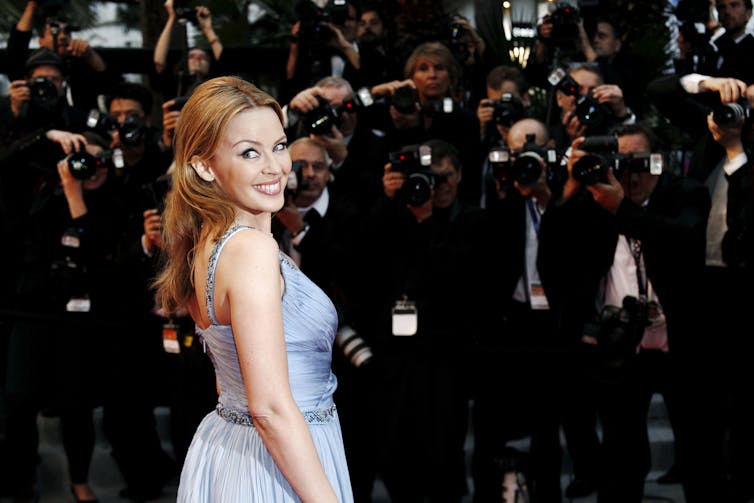Mbappé, who is due to move to Spanish giants Real Madrid at the end of this season, has already taken steps to register a logo depicting his celebration as a trademark in several countries, as well as in the European Union. He has done the same for his surname, initials and most famous quotes.
The black-and-white logo depicts a smiling Mbappé, celebrating in his usual fashion.
Mbappé is not the only famous athlete who has looked to secure exclusive rights to their signature celebration. In 2022, Jamaican sprinter Usain Bolt applied to trademark a logo in the US showing his victory celebration pose – an application with the US trademark office that is still pending.
Among the products covered by Mbappé’s trademark registrations are clothes, textiles, footwear, toys, video games, umbrellas, bags, jewellery, perfumery, cosmetics and toothpastes. Any products or brands that wish to use his specific logo, name or quotes will need to pay Mbappé or be granted permission by Mbappé himself.
But how can even the celebratory pose of a sporting star become a brand? To answer this question, we need to look at the nature and function of trademarks.
What trademark law says
A trademark is used in the course of trade to distinguish the goods and services of a company from those of competitors. The key, though not only, function is to indicate the commercial origin of a product.
Logos representing a famous athlete’s iconic pose may satisfy this requirement. Such postures can create a stronger association between the player and the products to which their image is affixed, offering a more distinctive characterisation compared with a traditional portrait-style image. Such branding allows consumers to distinguish the products from the goods sold by others, effectively functioning as an indication of commercial source.
For example, if we see a toy, blanket, birthday card or poster in a shop that features Mbappé’s trademarked celebration logo (or any other trademarks incorporating his image, name and initials), we will probably think those products are marketed by Mbappé himself.
So, if a business sells such branded goods without his authorisation, it will probably be a trademark infringement. This is because consumers would buy the product in the erroneous belief that they are official Mbappé merchandise.
Mbappé is a sports icon with hundreds of millions of fans and followers, including 112 million on Instagram. Thus, his trademarks may soon become notorious to a large range of consumers, especially if he ramps up the manufacture, sale and promotion of a variety of products bearing his brand. Owners of famous brands have a higher chance of prevailing in trademark infringement cases.
It would then be enough for Mbappé to show that a business which has sold a replica product incorporating his pose wants to take unfair advantage of the reputation of such a trademark. The same outcome would materialise if he could show that such a product is detrimental to his brand – for example, if the replica product bearing his brand is of poor quality.
Other celebrities have done the same. In 2016, Australian popstar Kylie Minogue started a battle with TV personality Kylie Jenner over the trademarking of their shared first name. Minogue claimed that her Kylie brand would be tarnished if Jenner were allowed to register an identical or similar trademark, describing her as a “secondary reality TV personality”.
Leia mais: Kylie vs Kylie – who will win the legal battle between Minogue and Jenner?

Protecting free speech
But there are also downsides to a trademark protection strategy based on the registration of every aspect of an athlete’s image and personality. It may limit the freedom of the public – and especially sports fans – to celebrate or criticise their icons.
Take, for instance, a website dedicated to Mbappé that serves as a forum where fans can exchange opinions about the player’s sporting performance and marketing activities. And let’s imagine that the website’s homepage features Mbappé’s trademarked celebration pose, his name or a famous quote prominently, and hosts fan commentaries that are highly critical of any of his activities.
Mbappé could, in theory, enforce his trademark rights to stop what he may consider a use of his trademark that tarnishes or even takes advantage of its reputation. This would be even more applicable if the website hosts advertising banners and sponsored sections, as Mbappé could claim that his brands are being somewhat exploited commercially.
But such an enforcement would unduly restrict the right of football fans to free speech. It would also unjustifiably allow trademark owners to stop their brands being used for purposes that are not strictly commercial. We should all be entitled to celebrate or criticise our favourite players by posting commentaries about their behaviour on and off the pitch, and including their iconic pose.
Mbappé’s trademark protection strategy is certainly legitimate and in line with the current branding trends of most celebrities. But the French football star would be better advised not to enforce his trademarks against whoever simply expresses opinions and ideas about him without a strict economic purpose.
The risk is not only to lose the legal case, but also alienate fans who may end up disappointed about their idol’s willingness to be overly litigious.
Declaração de transparência
Os autores não prestam consultoria, trabalham, possuem ações ou recebem financiamento de qualquer empresa ou organização que se beneficiaria deste artigo e não revelaram qualquer vínculo relevante além de seus cargos acadêmicos.

